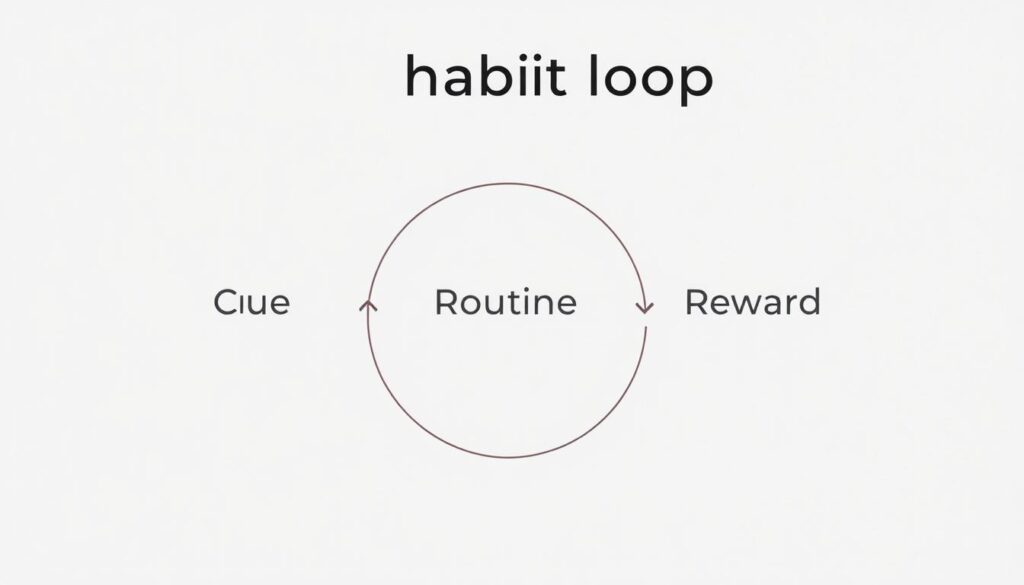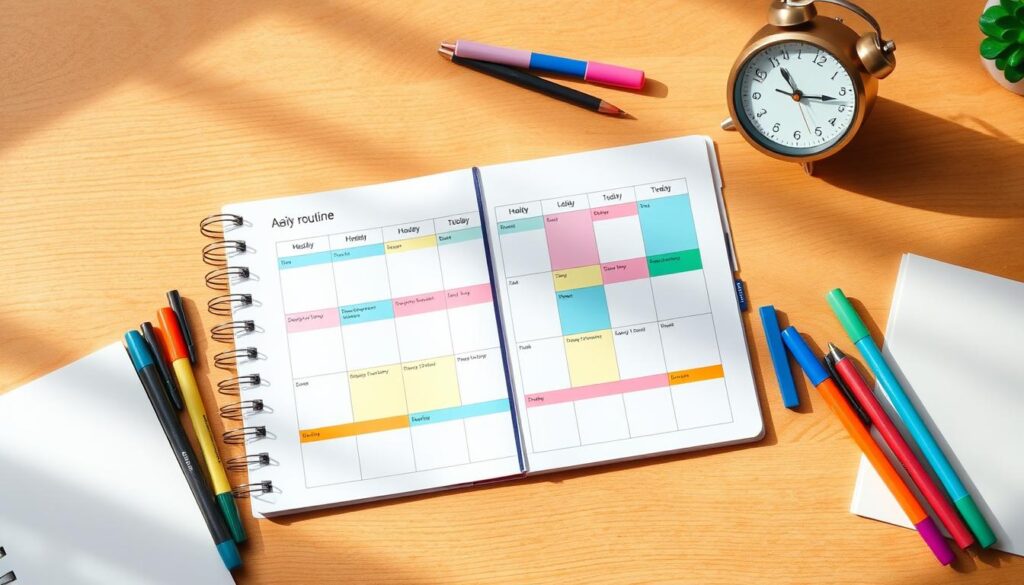Charles Duhigg, author of The Power of Habit, said, “You don’t have to be aware of all your habits to change them.” This insight is key to changing our lives by understanding and changing our habits.
Building healthy habits can greatly improve our lives. By creating routines that support our well-being, we can be more productive and feel better mentally. This guide will dive into the science of habits and offer a simple way to make lasting changes.
With the right tools and knowledge, you can start your journey to a more mindful and productive life. We’ll suggest Amazon products, like habit trackers and planners, to help you on your way.
Key Takeaways
- Understand the science behind building and breaking habits
- Learn a simple framework for creating lasting change
- Discover tools and resources to support your habit-forming journey
- Improve your overall quality of life by establishing healthy routines
- Boost your productivity and mental well-being
Understanding Habits: What Are They and Why Do They Matter?
Habits shape our actions and decisions, often without us noticing. By understanding habits, we can improve our daily lives a lot.
To fully understand habits, we must explore their science. Habits are automatic responses to cues, followed by a routine, and then a reward. This is called the habit loop. Knowing this loop helps us see and change bad habits.
The Science Behind Habits
The habit loop has three parts: the cue, the routine, and the reward. The cue starts the habit, the routine is the action, and the reward is the benefit. Understanding this is key to making consistent daily practices that help us reach our goals.
For example, to start a daily exercise routine, you might wake up at 6 AM (cue). Then, go for a jog (routine). And reward yourself with a healthy breakfast. This way, you can build daily habits for success that boost your productivity and well-being.
The Role of Habits in Daily Life
Habits greatly impact our daily lives, affecting our productivity, health, and happiness. Good habits make our routines smoother, helping us reach our goals. For instance, regular exercise, healthy eating, and consistent sleep improve our well-being.
| Habit Component | Description | Example |
|---|---|---|
| Cue | Trigger that sets off the habit | Waking up at 6 AM |
| Routine | Behavior or action taken | Going for a jog |
| Reward | Benefit or payoff of the behavior | Enjoying a healthy breakfast |
By understanding and using the science of habits, we can create daily routines that support our goals and improve our lives. Whether it’s better health, more productivity, or feeling more fulfilled, habits are a powerful tool for success.
The Components of a Habit: A Simple Breakdown
To create a productive routine, we need to understand habits. Habits shape our daily lives. Knowing how they work helps us make positive changes.
At the core of every habit is the Habit Loop. It breaks down into three parts: Cue, Routine, and Reward.
Cue, Routine, Reward: The Habit Loop
The Cue is what starts the habit. It could be a time of day, an emotion, or an event. The Routine is the action that follows, which is the habit itself. The Reward is the good feeling we get from doing the habit.
For instance, checking your phone as soon as you wake up is a habit. The cue is waking up, the routine is checking your phone, and the reward is feeling connected or informed.
| Cue | Routine | Reward |
|---|---|---|
| Waking up | Checking phone | Feeling connected |
| Feeling stressed | Nail biting | Temporary relief |
| Arriving at work | Grabbing a coffee | Boosting energy |
Making Sense of Triggers and Context
Knowing the cue is key. It helps us spot the triggers of our habits. A daily routine planner can track these cues and their context.
To build good habits, we must be aware of the cues. We should make sure our routines reward us positively. This way, we can develop positive habits that make our lives better.

By understanding the parts of a habit and their roles, we can start changing our habits. This is the first step to a more productive life.
Building Good Habits: Effective Strategies
Creating lasting habits starts with understanding how they form. Knowing how habits work helps you create strategies for positive change in your life.
Start Small: The Power of Tiny Changes
Starting small is a great way to build good habits. Tiny changes help you build momentum without feeling overwhelmed. For example, start with just 5 minutes of reading each day. As it becomes a habit, you can increase the time.
Studies show starting small is key to forming successful habits. It’s about creating a system that supports your goals and encourages consistent daily practices.
Consistency is Key: Daily Commitment
Consistency is vital for building good habits. It’s about making a change every day, not just once. Create a routine and stick to it, even when it’s hard.
Use tools like habit-tracking journals or apps to stay committed. For example, the “Habit Tracker Journal” on Amazon lets you monitor your habits and see your progress.
Finding Your Motivation: Why It Matters
Understanding your motivation is key to building good habits. Your motivation drives your commitment to change. It keeps you going, even when faced with challenges.
To find your motivation, ask yourself why you want to build this habit. What are your goals, and how will this habit help you achieve them? For example, wanting to improve your daily exercise habits might be to feel healthier or more energized.
| Habit | Starting Point | Consistency Strategy | Motivation |
|---|---|---|---|
| Daily Reading | 5 minutes/day | Track progress with a reading log | Improve knowledge and relaxation |
| Exercise | 10 minutes/day | Schedule it in your daily planner | Enhance physical health and energy |
| Meditation | 2 minutes/day | Use a meditation app for guidance | Reduce stress and improve mental clarity |
By understanding and applying strategies for building good habits, you can make lasting changes. These changes improve your daily habits and contribute to your success.
Breaking Bad Habits: Steps to Success
The first step to break bad habits is to see the patterns that hold you back. It’s a journey of understanding your habits, spotting triggers, and finding new ways to behave.
Identifying Triggers: Knowing Your Weaknesses
To start breaking a bad habit, you must know what sets it off. These triggers can be emotions, people, places, or certain situations. Knowing them helps you get ready for the challenges you’ll face.
- Keep a habit journal to track when and where you exhibit the bad habit.
- Reflect on your feelings and circumstances surrounding the habit.
- Identify patterns or common triggers.
Studies show that knowing your triggers is key to breaking bad habits. Habit tracking apps can also be very helpful in this journey.
Substituting Habits: Finding Alternatives
After spotting your triggers, it’s time to swap your bad habits for better ones. This means finding a new routine that meets the same needs as the old habit.
Steps to Substitute Habits:
- List your bad habits and their triggers.
- Find alternative habits that serve the same purpose.
- Practice the new habit consistently.
For example, if junk food is your go-to when stressed, try a healthier snack or a calming activity like meditation or a short walk instead.

By knowing your triggers and swapping bad habits for good ones, you can establish healthy routines. Remember, it’s all about being consistent and patient. With time, you can create a daily routine that boosts your well-being and helps you develop positive habits.
The Power of Routines: Structuring Your Day
Creating a daily routine can change your life for the better. It helps you stay productive and feel good. By organizing your day, you can focus on what’s important and manage your time well.
Morning Routines: Set the Tone for Success
Starting your day right is key. A good morning routine can make you feel ready to go. Try activities that make you feel energized and motivated, like:
- Meditation or deep breathing exercises
- A short workout or yoga practice
- Journaling or planning your day
- A healthy breakfast or smoothie
Using a daily routine planner can keep you on track. You can find many planners on Amazon that fit your style.
Evening Routines: Wind Down and Reflect
An evening routine is just as important. It helps you relax and get ready for bed. Good evening activities include:
- Reading or listening to calming music
- A warm bath or spa treatment
- Reflecting on your day and planning for tomorrow
- Practicing gratitude or mindfulness
By establishing a productive routine, you can sleep better, feel less stressed, and wake up feeling great.
Here’s a quick look at some daily routine planners on Amazon:
| Planner | Features | Price |
|---|---|---|
| Passion Planner | Monthly and weekly spreads, goal setting templates | $30 |
| Erin Condren LifePlanner | Colorful designs, monthly and weekly views, stickers | $50 |
| Happy Planner | Vertical layout, stickers, goal setting pages | $20 |
Adding these routines to your life can improve your daily habits and balance work and personal life. The most important thing is to find a routine that suits you and stick to it.
Accountability and Support: Harnessing Social Influence
Building consistent daily practices is easier with a supportive community. Surrounding yourself with people who share your goals helps you stay on track. This way, you’re more likely to succeed.
Finding a Habit Buddy: Shared Goals
Finding a habit buddy can change your game. Sharing your goals with someone creates accountability. This motivates you to keep up with your daily habits.
Support and encouragement come from your buddy. This makes the journey more fun. You face challenges together, making it easier to overcome them.
To find a habit buddy, look for groups that match your goals. This could be a fitness class or a book club. The goal is to find people who support positive habits and your journey.

The Role of Online Communities
Online communities are key for developing daily practices. They offer a place to share progress and get feedback. You connect with others on similar paths.
Platforms like Habitica and HabitBull are great for tracking habits and finding support. Online forums and social media groups also offer valuable resources. For example, Reddit has subreddits for habit formation and personal development.
| Platform | Type | Features |
|---|---|---|
| Habitica | App | Habit tracking, gamification, community support |
| HabitBull | App | Habit tracking, reminders, community sharing |
| Website | Community forums, subreddits for habit formation |
Using these resources and finding the right support can boost your habit development. Studies show that support systems help you stick to habits. This is key to achieving your goals.
Tracking Your Progress: Tools and Techniques
Tracking your progress is key to forming good habits. By watching your daily actions, you can spot patterns and stay motivated. You can also tweak your routines as needed.
Journaling Your Habits: Benefits of Reflection
Journaling is a great way to track your habits. It lets you reflect on your day, celebrate your wins, and plan for better tomorrow. Writing down your thoughts helps you understand your journey better.
Using a daily routine planner can boost your journaling. It helps you plan your day, set achievable goals, and track your progress. Studies show that people who use planners tend to form better habits.
Using Apps and Tools: Tech for Habit Formation
Today, many apps and tools can help you improve daily habits. From simple tracking apps to full lifestyle management tools, tech can make habit-forming easier. It keeps you on track.
Popular tools include habit-tracking journals like “Habit Tracker Journal” and “The 5-Minute Journal” on Amazon. These tools offer structured ways to monitor your habits and offer tips and encouragement.
| Tool | Description | Benefits |
|---|---|---|
| Habit Tracker Journal | A dedicated journal for tracking daily habits | Helps in maintaining consistency, provides a visual record of progress |
| The 5-Minute Journal | A journal that guides you through daily reflections | Enhances mindfulness, encourages gratitude, and supports goal setting |
| Habitica | A habit-tracking app that gamifies your tasks | Makes habit formation engaging, allows for community support |
By mixing old-school journaling with new apps and tools, you can build a strong system for tracking your progress. This mix offers a complete view of your habit-forming journey. It helps you establish and maintain healthy routines.
Staying Motivated: Overcoming Challenges
Staying motivated means celebrating our small wins. We all face challenges when trying to build good habits. But, with the right approach, we can beat these obstacles and keep moving forward.
Celebrating Small Wins
Celebrating small victories is key to staying motivated. Acknowledging our successes helps us keep doing what works. It’s as simple as treating yourself or sharing your wins with friends.
- Keep a journal to track your progress and reflect on your achievements.
- Set milestones and reward yourself when you reach them.
- Share your successes with a friend or family member to gain support and encouragement.
For instance, using a habit-tracking app or a motivational journal available on Amazon can be a great way to stay on track. 
Dealing with Setbacks
Setbacks are part of the habit-forming journey. The important thing is to bounce back without losing sight of our goals. We should learn from these setbacks and keep moving.
Strategies for bouncing back include:
- Re-evaluating your goals and making adjustments as necessary.
- Identifying the triggers that led to the setback and developing strategies to avoid or manage them.
- Focusing on the progress you’ve made so far and the reasons you’re working towards your goals.
By using these strategies and staying positive, we can overcome any challenge. Remember, building good habits is a long-term effort. Staying motivated is essential to reaching your goals.
As you keep going, think about using tools and resources to help you. Motivational books or reward systems on Amazon can give you extra motivation. They can help you stay focused on your goals.
The 21/90 Rule: Habit Formation Myth
The 21/90 rule is often mentioned when talking about habits. It claims it takes 21 days to form a habit and 90 days to make it a permanent change. But, research shows this is more of a myth than fact.
Understanding the Timeline for Change
The time it takes to form a habit varies a lot. Some people pick up new habits quickly, while others take months or even longer. It’s important to remember that forming habits is a personal journey. There’s no one timeline that fits everyone.
Factors influencing habit formation include:
- The complexity of the habit
- The individual’s motivation and commitment
- The presence of triggers or cues
- The consistency of practice
As James Clear, author of “Atomic Habits,” says, “You do not rise to the level of your goals. You fall to the level of your systems.” This shows how important it is to build the right systems to support your habits.
Personalizing Your Habit Routine
To establish a productive routine and improve daily habits, you need to make it personal. This means understanding your unique needs, preferences, and lifestyle. By doing this, you can create a daily routine that fits your goals and is more likely to last.
One way to make your habit routine personal is by using customizable tools like planners. For example, tools like the Passion Planner or the Erin Condren LifePlanner can help you organize your day, set realistic goals, and track your progress.
“The secret of your future is hidden in your daily routine.” – Unknown
This quote shows how important a well-structured daily routine is for achieving your long-term goals.
Adapting to Change: Revising Your Habits
Change is always happening, and we must update our habits to keep up. As we go through life, our needs and goals change. It’s key to notice when our habits need a refresh.

Life Transitions: Adjusting Your Routines
Big changes, like new jobs or moving, affect our habits a lot. It’s important to check our routines and tweak them to fit our new life. Using a daily routine planner can help stay organized.
For example, working from home requires new habits to stay focused. You might set a schedule, have a special workspace, and set limits with family.
Keeping Habits Fresh: Avoiding Boredom
Even good habits can get old if we do the same thing all the time. To keep our habits positive, we need to mix things up. This means setting new goals, trying new ways to reach them, or adding new activities to our day.
For instance, if you’re tired of the same workout, try a new place, exercise type, or workout buddy. This keeps things exciting and stops boredom.
Research shows that being flexible with our habits is key to success. By embracing change and updating our habits, we can keep growing and reaching our goals.
The Long-Term Perspective: Sustaining Habits
Building lasting habits requires a long-term view. It’s not just about setting routines. It’s about keeping them up, even when life gets tough. Understanding the value of daily habits helps us face the challenges of building them.
Evaluating Your Habits: Time for Reflection
Checking in on your habits regularly is key to lasting success. Take time to think about your daily habits for success. Ask yourself if they match your goals. Look for triggers that might lead to bad habits.
Reflecting on your habits helps you see what’s working and what’s not. This lets you make changes that help you grow. It’s about being honest with yourself and making changes to keep moving forward.
Continuous Improvement: An Ongoing Journey
Continuous improvement is central to keeping habits alive. It’s a journey that needs patience, persistence, and a willingness to change. Seeing habit formation as a never-ending process keeps you motivated to improve daily habits.
Using tools like habit trackers or journals can really help. There are many tools out there, like those on Amazon, that support consistent daily practices. These tools offer the motivation and structure you need to stay on track.
- Regularly evaluate your progress to stay on track.
- Be open to adjusting your habits as needed.
- Use tools and resources that support your habit formation journey.
By focusing on the long-term and continuous improvement, your habits can stay positive. Remember, the path to keeping habits is long, and it’s okay to adjust as you go.
Final Thoughts: Your Path to Daily Habits and Routines
Remember, being flexible is key when changing habits. It lets you adjust your habits as your life and goals change.
Embracing Flexibility in Habit Formation
Research shows that being flexible and personal in habits is key to success. This means trying new things and changing your routines as needed. It helps you find a routine that fits your life.
Personalizing Your Approach to Habits
To make a daily routine stick, think about using habit trackers from Amazon. These tools help you track your progress and understand your habits better.
By being flexible and making habits personal, you can make them a lasting part of your life. This way, you can reach your goals.
FAQ
What are the most effective ways to establish healthy daily habits?
To start healthy daily habits, first understand what motivates you. Then, set clear goals. Create a supportive environment to help you.
Start by picking the habits you want to build. Make a plan to add them to your daily life. Use tools like habit trackers and planners to stay on track.
How can I improve my daily routines to boost productivity?
To improve your daily routines, first analyze your current habits. Find areas to get better and make changes. This will help you use your time and energy better.
Try creating a morning and evening routine. This will help structure your day. Use planners and apps to stay organized.
What is the best way to break a bad habit?
To break a bad habit, first understand what triggers it. Then, find better habits to replace it. Identify the cues that lead to your bad habits.
Develop strategies to overcome them. Use tools like habit-tracking apps to monitor your progress.
How long does it take to form a new habit?
The time to form a new habit varies. It depends on the habit’s complexity and your motivation. The 21/90 rule is a myth.
Research shows timelines vary. Be patient and focus on making progress.
What role do accountability and support play in building habits?
A support system is key to building habits. It can be a habit buddy or an online community. Accountability and support motivate and encourage you.
They help you stay on track and overcome challenges.
How can I stay motivated to maintain my habits over time?
To stay motivated, celebrate small wins. Be resilient when facing setbacks. Continuously evaluate and improve your habits.
Use tools like reward systems and motivational resources. They help keep your motivation and commitment to your habits strong.
What are some effective tools and techniques for tracking progress and maintaining habits?
Effective tools include journaling and using habit-tracking apps. Regularly evaluating your habits is also key. These tools give insights into your habit-forming journey.
They help you identify areas for improvement and stay on track.
How can I adapt my habits to changes in my life?
To adapt your habits to life changes, be flexible. Identify the changes affecting your habits. Develop strategies to adapt to these changes.
Use tools like flexible planners and habit-tracking apps. They help you stay on track with your habits.














